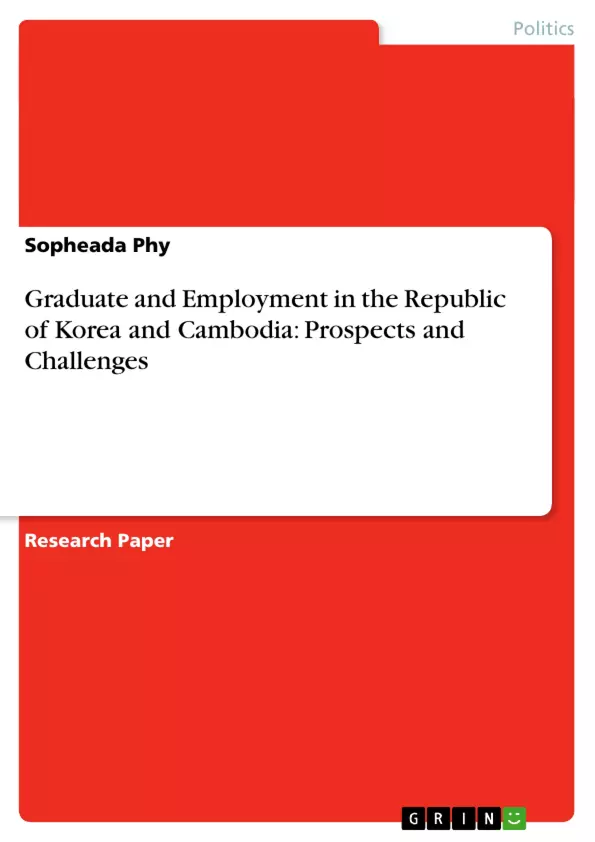The transition of graduates across the world from higher education attainment to working life is questionably still uncertain and failed to be investigated, with which set as the objective of this study. The purpose of this work is to explore the prospects and challenges of graduates in both the Republic of Korea and Cambodia on their routes from stepping into university to landing jobs in the labor market upon graduation. With this sense, the quality of higher education which if prepare students well for their future employment and the barriers hampering graduates in hunting jobs were comparatively discovered in this paper. By employing in-dept interview with senior students and graduates, and searching through document study, it could be drawn from the paper that the success or failure of graduates in the labor market can be distinctively yielded from the nexus of such factors as higher education outcome, personal endeavor, the image of university one derived from, gender performance, work experience, one’ s English proficiency, the match or mismatch between their majors and job demands, and people networks, based on the different cultural, social, political and economic contexts of both the Republic of Korea and Cambodia.
Inhaltsverzeichnis (Table of Contents)
- Abstract
- Introduction
- Higher Education and Student Expectation
- Students' In and Out-Campus Lives towards Education and Employment Prospects
- Graduate and Employment Challenges
- Image of University in the Labor Market
- The Role of Gender in the Labor Market
- English Language and Employment
- Well-Known Major or Skill Contribution in the Labor Market
- Military Joining versus Employment Prospect
- Graduate's Access in the Labor Market
- Graduate's Access in the Private Sector
- Graduate's Access in the Public Sector
- Conclusion
Zielsetzung und Themenschwerpunkte (Objectives and Key Themes)
This research aims to explore the challenges and prospects faced by graduates in both the Republic of Korea and Cambodia as they transition from higher education to the labor market. The study investigates the quality of higher education in preparing students for future employment and the barriers graduates encounter in finding jobs.
- The role of higher education in preparing graduates for employment
- The challenges graduates face in the labor market
- The impact of factors such as gender, English proficiency, and work experience on employment prospects
- The influence of cultural, social, political, and economic contexts on graduate employment
- A comparative analysis of graduate employment challenges in the Republic of Korea and Cambodia
Zusammenfassung der Kapitel (Chapter Summaries)
The first chapter introduces the research objective, focusing on the global trend of youth unemployment and the transition of graduates from education to work. The second chapter examines the role of higher education in preparing students for the world of work and discusses the expectations of students in both the Republic of Korea and Cambodia. The third chapter delves into the activities and experiences of students during their undergraduate studies, considering their perspectives on education and future employment prospects. The fourth chapter investigates various challenges graduates face in the labor market, including the impact of the university's reputation, gender, English language proficiency, major choice, and military service. The fifth chapter focuses on the access graduates have to the labor market, specifically examining opportunities in the private and public sectors.
Schlüsselwörter (Keywords)
This research focuses on the crucial themes of graduate employment, higher education, labor market challenges, and the socio-cultural context of graduate job prospects. The study specifically examines the experiences of graduates in the Republic of Korea and Cambodia, highlighting factors such as gender, English language proficiency, and the impact of military service on employment opportunities.
Frequently Asked Questions
What are the main challenges for graduates in South Korea and Cambodia?
Graduates face challenges such as the reputation of their university, gender performance expectations, English proficiency requirements, and the mismatch between their majors and job market demands.
Does the university's image affect job prospects?
Yes, the study shows that in both countries, the prestige or "image" of the university one graduates from plays a significant role in landing jobs, especially in competitive sectors.
How important is English proficiency for employment in these countries?
English language skills are highlighted as a crucial factor for success in the labor market, often serving as a barrier for those without high proficiency.
What is the impact of gender on the labor market?
The research explores how gender roles and performance expectations influence employment opportunities and career progression in different cultural contexts.
How does military service affect employment in South Korea?
The study specifically examines the nexus between military joining and future employment prospects for graduates in the Republic of Korea.
Are there differences between public and private sector access?
The paper provides a comparative analysis of how graduates access jobs in the private versus the public sector in both Cambodia and South Korea.
- Quote paper
- Sopheada Phy (Author), 2006, Graduate and Employment in the Republic of Korea and Cambodia: Prospects and Challenges , Munich, GRIN Verlag, https://www.grin.com/document/146974



